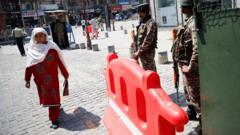In a critical response to recent violence in Indian-administered Kashmir that claimed 26 lives, US Secretary of State Marco Rubio has encouraged both India and Pakistan to collaborate on de-escalating their longstanding hostilities. This call for peace follows the tragic militant assault that struck near Pahalgam, an area popular with tourists. During separate discussions with India's Foreign Minister S Jaishankar and Pakistan's Prime Minister Shehbaz Sharif, Rubio emphasized the necessity of maintaining stability in South Asia.
**US Calls for Easing India-Pakistan Tensions Amid Kashmir Violence**

**US Calls for Easing India-Pakistan Tensions Amid Kashmir Violence**
The international community watches closely as the US urges India and Pakistan to de-escalate rising tensions following the deadly attack in Kashmir.
India blames Pakistan for harboring the militants responsible for the attack, while Pakistan vehemently denies these claims. In a series of retaliatory measures, India has proclaimed a closure of its airspace to all Pakistani flights, intensifying an already fragile situation. Indian officials have vowed to bring those behind the attack to justice, while the US has expressed sympathy and reaffirmed its backing of India's anti-terrorism efforts.
Both nations are caught in a mounting spiral of retaliatory actions. Indian forces have reportedly been authorized to respond as they see fit, and there is growing concern that India may undertake military action, reminiscent of past confrontations after severe militant attacks. Meanwhile, Pakistani officials claim to possess intelligence of an imminent Indian strike.
Recent tensions have resulted in significant border skirmishes, visa cancellations, and other diplomatic confrontations, including restrictions placed on Pakistani actors in India. With Kashmir being a focal point of conflict since 1947, the potential for further escalation looms large, prompting calls for international mediation and dialogue to avoid an additional conflict in this volatile region.
Both nations continue to navigate this precarious situation, as subjects of the Kashmir conflict remain contentious and rife with historical animosities. As the world watches, the hope remains for a peaceful resolution that can prevent further loss of life and foster stability in a region plagued by unrest.
Both nations are caught in a mounting spiral of retaliatory actions. Indian forces have reportedly been authorized to respond as they see fit, and there is growing concern that India may undertake military action, reminiscent of past confrontations after severe militant attacks. Meanwhile, Pakistani officials claim to possess intelligence of an imminent Indian strike.
Recent tensions have resulted in significant border skirmishes, visa cancellations, and other diplomatic confrontations, including restrictions placed on Pakistani actors in India. With Kashmir being a focal point of conflict since 1947, the potential for further escalation looms large, prompting calls for international mediation and dialogue to avoid an additional conflict in this volatile region.
Both nations continue to navigate this precarious situation, as subjects of the Kashmir conflict remain contentious and rife with historical animosities. As the world watches, the hope remains for a peaceful resolution that can prevent further loss of life and foster stability in a region plagued by unrest.



















